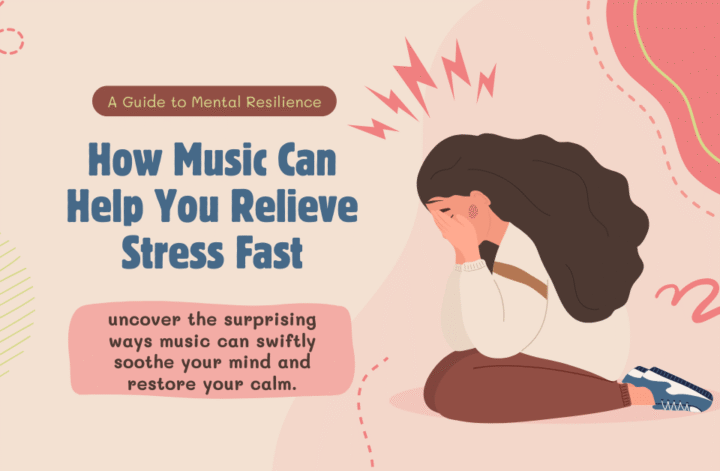We’ve all experienced it—those times when life piles more on us than we can manage, making us stressed out and overwhelmed. Whether it’s the constant responsibilities of work, financial strain, or just the stress induced by uncertainty, stress has become an integral part of some of our everyday lives. With lockdowns and social distancing preventing us from doing things such as going to the cinema, shopping, or exercising, it can be like we’re trapped in a pressure cooker. But there’s some good news: music could be the solution to our stress. In ancient China, during the Wei-Jin period, the poet Ruan Ji believed that music was able to soothe the body and mind. Contemporary science concurs with this age-old wisdom and proves that listening to music can be one of the best means of reducing stress and anxiety. But not all music is equal—some songs can actually exacerbate the condition. So, what type of music can actually help us relax?
What Type of Music Reduces Stress?
Music can be categorized into two broad categories according to its emotional effect: relaxing and stimulating. Relaxing music is slow, soft, and with minimal rhythmic movement, such as Chopin’s “Prelude in D-flat major.” Stimulating music, in contrast, is fast, loud, and rhythmic, such as Beethoven’s “Appassionata Sonata.” Normally, soothing music can calm us down and decrease anxiety better. Yet, it isn’t always like that, as researchers discovered. An experiment tested the influence of various sorts of music on people’s stress levels by providing them with a mental arithmetic test to arouse stress. Subsequently, participants listened to various types of music depending on their individual preferences—soothing or stimulating music—and were requested to assess their stress levels. The findings were surprising: while relaxing music did indeed decrease stress overall, personal preference was a big factor. Relaxing music only had the greatest stress-decreasing effect when the subjects were listening to music they disliked. When listening to liked music, both relaxing and stimulating music were beneficial in decreasing stress. This discovery points to the significance of music preference in the stress-reducing process.
The Importance of Personal Taste in Music’s Ability to Relieve Stress
Why, then, are our own music tastes so important? The reason has to do with how our brains respond to music that we like. One study, which was published in Science, employed functional magnetic resonance imaging (fMRI) to monitor brain activity as individuals listened to their favorite music. The findings were unequivocal: when individuals listened to music they enjoyed, brain regions involved in reward—namely the striatum and the nucleus accumbens—were stimulated, releasing dopamine, the “feel-good” neurotransmitter. Activation of the brain’s reward system is one of the reasons why music can be such an effective stress reliever. When we listen to music we love, our brain releases dopamine, which not just makes us happy but also makes us less anxious and stressed. Essentially, hearing our favorite songs accesses our brain’s own reward system, leading us to be happier and more relaxed.
How Does Music Trigger and Regulate Emotions?
You may be wondering, how is music actually doing this to produce these emotional responses in the first place? The key is found in the tension and release created by music, naturally. It has been claimed by composer Hindemith, “Music is nothing but tension and release.” The ongoing game of tension vs. relaxation, as it is, is responsible for the power of music, emotionally. With these elements and more, like rhythm, tempo, and harmony, music sets up tension. For instance, unstable chords or rapid rhythms may build up tension, while resolved chords and slow rhythms may dispel the tension, providing a soothing effect. Even without formal musical knowledge, we are still able to sense these subtle changes and respond emotionally to them. Our recent study even indicates that the brain reacts more quickly to rhythmic aspects than it does to harmonic shifts. This indicates that rhythm is central to how we sense tension in music. Rhythmic tension can be used to make sense of the emotions and can be one of the reasons music is a good means of controlling our mood.
Listening to Music to Overcome Stress and Anxiety
Thus, the next time you’re stressed or anxious, try going back to the music that you love. Either classical or rock, the secret is to play music that you like. Hearing the music you love can engage your brain’s reward system, causing you to be more relaxed and at ease. If you’re not sure where to begin, you can start listening to calming music initially, followed by switching gradually to more energizing music with decreased stress levels. Music is the best teacher when it comes to walking one through the emotional journey, easing the release of adverse feelings, and cultivating a good feeling.
Conclusion: Maintaining Your Mental Wellbeing With Music
In the face of trying times, never before has caring for our mental health been so imperative. Music can be such an easy and potent tool for assisting us to control stress and emotion. Simply listening to music we like individually allows us to switch on the brain’s reward mechanism, which lets go of tension and produces relaxation. Therefore, if next time you find life gets a bit much, remember to crank up the stereo and have music work its magic. With the right music, we can get through these difficult times a little easier and a whole lot happier. Stay safe, stay happy, and let the music guide you through!




